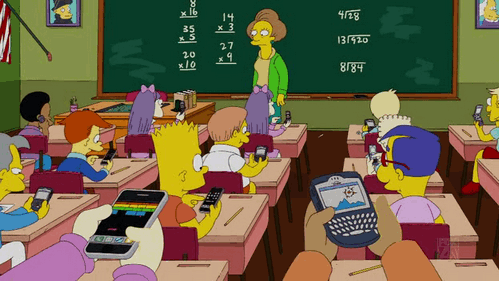Orginally posted: July 7, 2016
As I was reading this week’s chapter–Afterword: Communities of Readers, Clusters of Practices by Henry Jenkins, I found that I had to think about the optimistic view of our networked culture and what it can mean for education within the context of old-world realities. What I mean by “old-world” refers to business models and expectations of an educational system that are not conducive to integrating and leveraging networked cultures for purposes of education.
We have an education system that teaches to seemingly arbitrary standards. It is a system that expects all students to learn and take away the same things. Instructor passes along information. Student learns (or doesn’t learn) that information which is reflected by various forms of assessment. Not everyone learns, or engages with information in the same manner. It is this homogeneity that is contrary to the ideas of learning and networked cultures.

Integrating social networked learning into an educational system that doesn’t support it is like trying to fit a square peg into a round hole. Something needs to change to move forward. The nature of the current educational system’s business model and pedagogical ideas need some altering to accommodate new forms of learning and technology. I’m not saying that I even have the faintest idea of what or how to change our current system of education. That is for smarter people than myself to figure out. Get on it, nerds.
The new literacies that we engage in participating in online communities and social networks are skills that everyone will require to function into the future. And leveraging these technologies and behaviors for the purposes of learning will take study and effort. One thing is certain–kids raised immersed in a networked culture will become instructors themselves and bring their unique understandings of literacies to bare. (Squire).
We can look at our participation in networked cultures and how that relates to education through the lens of video games. A paper titled Video Game Literacy: A Literacy of Expertise by Kurt D. Squire had some interesting points that gave me a better understanding of how we interact and learn through social networks. We produce “meaning with texts and become expressive with technology in multiple forms” (Squire). Learning, or texts in a traditional classroom are static, “designed for a student or teacher’s consumption, but having little impact outside of the classroom,” where texts we engage with in games or in social networks are “lively, flowing across boundaries and borders as they serve social functions” (Squire). Like video games, our social networks are dynamic, ever changing spaces where we navigate, play, learn, and socialize.
I am not throwing the following block quote in for the sake of length. I think that it encapsulates a lot of what we have been discussing these last few weeks rather well even though it is stated in the context of video games.
Game-based literacies include a constellation of literacy practices that are quite different: texts are spaces to inhabit, learning as a productive, performative act, knowledge is legitimized through its ability to function in the world, participation requires producing as well as consuming media, expertise means leveraging digital spaces to further one’s goals, and social systems have permeable boundaries with overlapping trajectories of participation.
Changing an educational system that has existed and hasn’t changed much for quite some time to embrace these new literacy values and behaviors will be one of the grand efforts of our age. That may sound a bit hyperbolic, but it is a big challenge that I am sure will be overcome.
References
Afterword: Communities of Readers, Clusters of Practices by Henry Jenkins
https://narrateannotate.files.wordpress.com/2016/05/jenkins2008.pdf
Video Game Literacy: A Literacy of Expertise by Kurt D. Squire